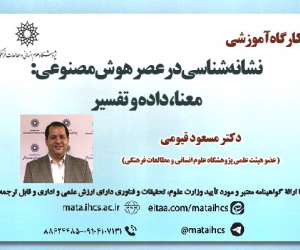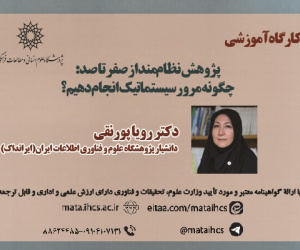خلاقیت و آفرینش در هنرهای نمایشی از نگاه ابن سینا
آرشیو
چکیده
ابن سینا، فیلسوف و دانشمند بزرگ ایرانی، یکی از پرنفوذترین متفکران جهان اسلام است که دیدگاه های او در زمینه های مختلف علمی و فلسفی، از جمله هنرهای نمایشی، تأثیرگذار بوده است. ابن سینا معتقد است که خلاقیت نتیجه ای از تعامل مستمر بین عقل و تجربه است. او بر این باور بود که هنرمندان باید از طریق تجربیات خود، ایده های جدید و ابتکارات هنری را کشف کنند و به کار ببرند. این فرآیند خلاقانه به هنرمند اجازه می دهد تا آثاری اصیل و نوآورانه خلق کند که نه تنها از نظر زیبایی شناسی بلکه از نظر معنوی نیز غنی باشند . از نگاه ابن سینا، آفرینش هنری فرآیندی است که در آن هنرمند باید با تکیه بر عقل و دانش خود، به بررسی و تحلیل دقیق موضوعات بپردازد و سپس با الهام گرفتن از تجربه ها و دیدگاه های جدید، اثری نوین و منحصر به فرد خلق کند. او تاکید می کند که خلاقیت نه تنها به توانایی هنرمند در ایجاد ترکیبات و ایده های جدید بستگی دارد، بلکه به تعهد و پشتکار او در پیگیری و تحقق این ایده ها نیز مرتبط است . در این پژوهش، به تحلیل دیدگاه های ابن سینا درباره ی خلاقیت و آفرینش در هنرهای نمایشی می پردازیم و نشان می دهیم که چگونه می توان از آموزه های او برای تقویت و ترویج خلاقیت در هنرهای نمایشی معاصر استفاده کرد. همچنین به بررسی تاثیرات این دیدگاه ها بر هنر و فرهنگ اسلامی پرداخته و نقش آنها را در تحولات هنری مختلف بررسی می کنیم .Creativity and Creation in the Performing Arts from the Perspective of Avicenna
Avicenna, the great Iranian philosopher and scientist, is one of the most influential thinkers in the Islamic world, whose views have been influential in various scientific and philosophical fields, including the performing arts. Avicenna believed that creativity is the result of the continuous interaction between reason and experience. He believed that artists should discover and apply new ideas and artistic innovations through their own experiences. This creative process allows the artist to create original and innovative works that are not only aesthetically but also spiritually rich. From Avicenna's perspective, artistic creation is a process in which the artist must carefully examine and analyze subjects, relying on his intellect and knowledge, and then create a new and unique work, inspired by new experiences and perspectives. He emphasizes that creativity depends not only on the artist's ability to create new combinations and ideas, but also on his commitment and perseverance in pursuing and realizing these ideas. In this study, we analyze Avicenna's views on creativity and creation in the performing arts and We show how his teachings can be used to enhance and promote creativity in contemporary performing arts. We also examine the impact of these views on Islamic art and culture and examine their role in various artistic developments.







